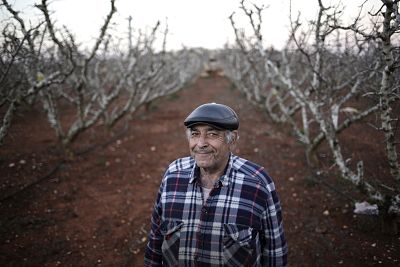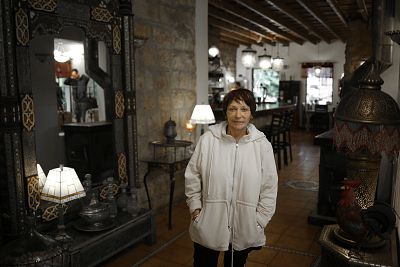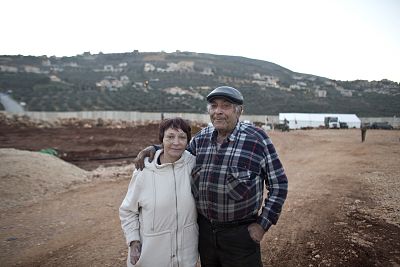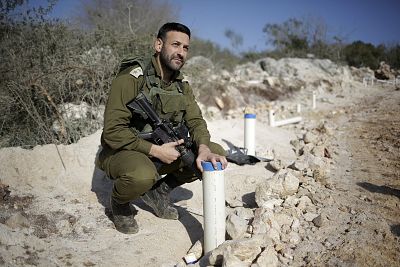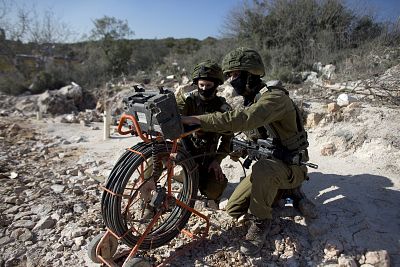Fears are running high that battle-hardened militants returning to Lebanon from Syria will intensify their focus on Hezbollah's original foe: Israel.
METULA, Israel — A soldier rushes up to a farmer who had just skirted a metal gate to get onto a patch of red earth.
"Move back," thesoldier commands as the hum of a generator fills the air.
"But this is my land," Haim Hod shoots back. Hod, 71, nicknamed Hamke, stands his ground alongside his wife, Miriam, on what is officially a restricted military area.
Behind the couple, rows of winter-bare apple trees march down toward Metula, Israel's northernmost town. The soldier is guarding a long white tent that squats before a huge concrete wall. Above the imposing barrier looms a hill speckled with houses — the Lebanese town of Kafr Kela.
Only a few weeks ago Hod's trees grew on what is now beaten-down earth. On Dec. 4, the couple and the nation were told that an "attack tunnel" had been discovered in Israeli territory that led into Lebanon.
The first of the six tunnels that were eventually found ran under farmland near Metula, which sits among apple, plum and peach orchards that ring with the chirrups of parakeets and the caw-caw of crows.
Officials later warned that hundreds of Hezbollah fighters could have streamed through the tunnels, kidnapping and killing civilians and soldiers.
Some in Metula theorize that the town as a whole would have been captured by Hezbollah — a pro-Palestinian militant group and political party that dominates Lebanese politics and is sponsored by fervently anti-Israel Iran.
Hezbollah fighters are coming home from the war winding down in Syria, where they helped prop-up President Bashar al-Assad as he battled rebels trying to unseat him. Fears are running high that as the battle-hardened militants return to an estimated arsenal of 100,000 rockets and missiles, they will intensify their focus on their original foe: Israel.
Metula, at the tip of a stretch of land jutting north into Lebanon, is especially vulnerable to the frequent flare-ups with enemies across the border. The town was shelled during the 2006 Hezbollah-Israel war, which devastated parts of Lebanon.
In the decade before the 1982 Israeli invasion of southern Lebanon, rockets from Palestinian fighters often sent the people of Metula running to shelters.
But not Hod — rockets weren't going to drive this third-generation farmer from his home.
His stoicism was beyond exasperating when warning sirens sounded and his wife chased the couple's four children to safety.
After she got the family, minus dad, into a shelter the kids cried over Hod's absence.
"He is never afraid," Miriam Hod says over dinner in a hotel the couple run in town. "That is the problem."
Haim Hod smiles, his white teeth standing out against skin darkened by working in the fields since the age of 9.
"In all the wars, I have never gone to the shelter," Hod said. "I always sleep in my bed."
Hod may be brave, but he wept last month when he saw what the army had done to his orchard. The military rolled over his precious apple trees, snapping trunks and branches as they sped toward the newly discovered Hezbollah tunnel. The clearing made, 350 trucks flooded the tunnel with cement.
"The trees are like my children," he says. "But security comes before children."
The government will reimburse the Hods for losses incurred during the operation.
The Hods' long tenure in Metula has seen many such trade-offs, the thick stone walls of the 120-year-old family home having been buffeted by waves of war and hardship.
Haim Hod's grandparents were the first couple to be married in the town after Baron Edmond de Rothschild, who encouraged the settlement of Jews in what is now Israel, bought the land from a local Arab family.
Times were often hard and it took the family four decades to repay the French banking scion. Along with other villagers, they periodically had to flee violent flare-ups.
After the state of Israel was created in 1948, poverty drove many of Haim Hod's 10 uncles and aunts away. Some went abroad, but others stayed and helped "build Israel," Miriam says.
Now Israel is warning that it may strike Hezbollah because of the tunnels.
"This is not merely an act of aggression. This is an act of war," Prime Minister Benjamin Netanyahu said soon after the tunnel's discovery was announced. "The people of Lebanon have to understand that Hezbollah is putting them in jeopardy and we expect Lebanon to take action."
Such statements and are part of a wider effort to keep Hezbollah and Iran away from Israel's northern border. Israel has only recently admitted carrying out thousands of attacks on Iranian forces in Syria since 2011, abandoning a policy of secrecy that cloaked its military forays.
On Jan. 20, Israel attacked targets near Damascus — killing 21, including at least 12 members of Iran's Revolutionary Guard, according to a Syrian war monitoring group.
In response, Iran launched a rocket toward the crowded Mount Hermon ski resort. It was intercepted by Israel's missile defense system. On Monday, the head of Iran's air force announced: "We're ready for the decisive war that will bring about Israel's disappearance from the Earth."
Politics
While Israel's strikes on Syria are not unusual, drawing attention to them so publicly is, said Daniel Byman, a professor at Georgetown and a senior fellow at the Brookings Institution.
Hezbollah regularly engages in attempts to encroach on its enemy, Byman said.
"Sometimes it is missiles, sometimes it is tunnels, and sometimes it is positions in Syria," he says.
When Hezbollah's leader finally owned up to building the tunnels late on Saturday, he indicated that the group would need more than a few tunnels if it ever decided to invade Israel.
Hassan Nasrallah also told Beirut-based Al-Mayadeen TV station that some of the tunnels were old, and called their late discovery "a 13-year-old intelligence failure."
In spite of Hezbollah's saber rattling, most experts agree that it does not want a full-scale war with Israel, which is vastly stronger militarily. But there is always the chance that a miscalculation could spiral into one.
Lt. Col. Avshalom Dadon does not intend to make any such mistakes. In his capacity as an engineering officer in the 91st Division, he helped oversee the discovery of the six tunnels found running into Israel.
"We weren't surprised that we found tunnels," said Dadon, 33. "But we were surprised by their magnitude and infrastructure, and the effort the Hezbollah obviously put into them."
Each was different, he says — although they were all big enough for a man to stand upright in and were all wired for electricity.
Just a few hundred feet behind him, a barrel on a pole painted blue and emblazoned with 'U.N.' marks the boundary with Lebanon.
This is the Blue Line, the border demarcation between the countries. Clearly visible nearby, a cluster of Lebanese soldiers watch. One takes pictures as members of the elite Yahalom engineering unit, faces covered in black balaclavas, drop a tiny camera through a white tube into the tunnel.
"I understand who our neighbors are, and that we're surrounded by enemies," Dadon says at a site where a tunnel was pinpointed near the town of Zar'it. "I totally understand that the people we are facing aren't stupid. They are learning about the IDF every day," he said, referring to the Israeli Defense Forces.
Dadon punches a fist into his hand several times to describe the process of carving into the hard Dolomite rock. Hezbollah worked for years to dig through the earth here in northern Israel, often living in the tunnels as they built them, he says.
Dadon likens the operation to locate the tunnels to looking for a needle in a haystack, and says his forces drilled more than 600 holes in the ground to depths of around 60 feet until the six were pinpointed.
He breaks into a soft smile as he describes the excitement he felt at discovering the tunnels after years of searching.
"My wife would kill me to say this, but finding the tunnels — it's a little like giving birth," says the father of two.
In Metula, a two-minute walk from the Hods' hotel, students at the town's primary school discuss regular emergency drills overseen with military precision by headmistress Marsel Leev.
News
Noga, 11, explains that these help make her feel safe. And as she grows "older and older," she is feeling "less and less stress" about the threat they all face.
The girl repeats this breathlessly at least three times, brown eyes widening with emphasis behind dark-rimmed glasses.
Later, Leev walks up a flight of stairs and opens curtains in a classroom to expose a wide panoramic view. The window frames orchards, houses and a road leading out of Metula. Just beyond that snakes the border wall, and then fields, houses and the mountains of Lebanon.
The building, teachers and students are in themselves a symbol of resilience, she says.
"The fact that here you have a school that is 150 meters from the border is a statement to the other side," Leev says. "We will stay here for generations."












